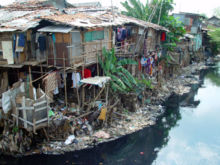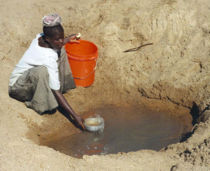Difference between revisions of "Existing scarcity"
From AdCiv
(→So what surmountable scarcity exists today?) |
|||
| Line 1: | Line 1: | ||
=== So what surmountable scarcity exists today? === | === So what surmountable scarcity exists today? === | ||
| − | All the usual suspects, and a lot applies as much to Western countries as it does to the developing world. | + | All the usual suspects, and a lot applies as much to Western countries as it does to the developing world. There still exists unnecessary scarcity of: |
*Clean energy | *Clean energy | ||
| Line 8: | Line 8: | ||
*Medicine and medical facilities | *Medicine and medical facilities | ||
*Decent housing in slum areas | *Decent housing in slum areas | ||
| + | *{{wp|Sustainable_development|Sustainable development}} | ||
*High quality, interesting education | *High quality, interesting education | ||
*Safe and efficient transportation that doesn't kill passengers or contribute to changing our climate | *Safe and efficient transportation that doesn't kill passengers or contribute to changing our climate | ||
| Line 27: | Line 28: | ||
*Inadequate co-operation (lack of communication and sharing of knowledge) | *Inadequate co-operation (lack of communication and sharing of knowledge) | ||
*Self-interest (at many levels) | *Self-interest (at many levels) | ||
| + | *Cultural inertia (that's the way it has always been done) | ||
*Lack of trust | *Lack of trust | ||
*Ignorance | *Ignorance | ||
Revision as of 02:36, 5 December 2008
So what surmountable scarcity exists today?
All the usual suspects, and a lot applies as much to Western countries as it does to the developing world. There still exists unnecessary scarcity of:
- Clean energy
- Clean water
- Nutritious food
- Medicine and medical facilities
- Decent housing in slum areas
- Sustainable development

- High quality, interesting education
- Safe and efficient transportation that doesn't kill passengers or contribute to changing our climate
- The facilities for people and communities to do more things for themselves - we are too reliant on machines and products from big business
- Resources to get things done that need to be done - at a community level — sounds woolly perhaps but covers uncountable worthy projects that simply don't get done through lack of funds or bureaucratic hurdles
- Quality - quality products and architecture as examples.
- Time - people's time. Time to follow things important to the individual. Time for other people.
Causes
- Lack of appropriate technology
- Locked-up resources
- Short-term thinking
- Inadequate co-operation (lack of communication and sharing of knowledge)
- Self-interest (at many levels)
- Cultural inertia (that's the way it has always been done)
- Lack of trust
- Ignorance
- Incompetent government administration
- Bureaucracy
- War
- and in no small part, monetary economics
See also
- Scarcity
 (Wikipedia entry)
(Wikipedia entry) - Post-scarcity
- Mankind's fundamental resources


